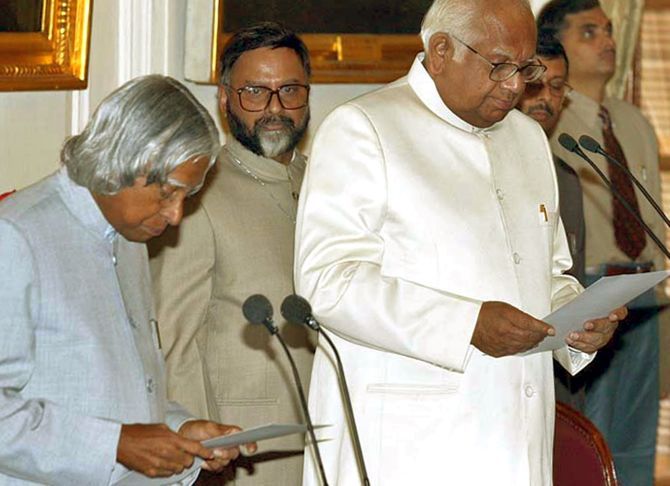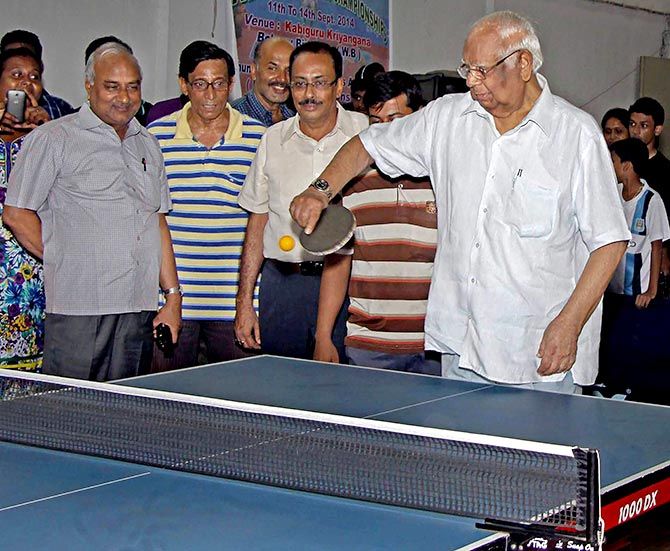 | « Back to article | Print this article |
The 89-year-old leader was expelled by the CPI-M after he refused to step down from his position as Speaker holding that the post is above any party politics.

An outstanding parliamentarian, Somnath Chatterjee was the first Communist to become the Lok Sabha Speaker and had once famously refused to accept a Supreme Court notice, demarcating the jurisdiction of the judiciary and the legislature.
The 10-time MP was associated with the Communist Party of India-Marxist for most part of his life and will be remembered as one of the most illustrious speakers of the Lok Sabha.
A close associate of Marxist leader Jyoti Basu, Chatterjee was unanimously elected as the Speaker of the Lok Sabha in 2004 during the United Progressive Alliance-I government.
After his party CPI-M, then under the general secretaryship of Prakash Karat, withdrew support from the UPA government in July 2008, Chatterjee refused to step down from his position holding that the Speaker’s post is above any party politics.
He was expelled by the CPI-M on July 23, 2008 for “seriously compromising the position of the party”.
He had described that day as “one of the saddest days of my life”.
“The speaker of Lok Sabha, like the speakers of other elected assemblies, while acting as such does not and cannot represent any political party,” he had said.
Chatterjee in his autobiography ‘Keeping the Faith: Memoirs of a Parliamentarian’ had criticised Karat who he called an “arrogant and intolerant man” and blamed his “misguided and disastrous policies” for weakening of the Left in the country since the 2009 Lok Sabha polls.
Despite his expulsion, his love for the party and its ideology remained undiminished.

After Sitaram Yechury took over the reins of the CPI-M, there were rumours that the party might take him back if he wrote to the leadership. But Chatterjee always felt he did no wrong in presiding over the trust vote as a Speaker and there was no question of apologising.
During his tenure as Speaker, Chatterjee had famously said in 2005 that the Supreme Court had crossed the ‘lakshman rekha’ in sending a notice to him regarding the power of the Lok Sabha to expel its members, in connection with the cash-for-query scandal.
Chatterjee, as the Speaker, had then refused to submit himself to the jurisdiction of the Supreme Court in hearing this matter.
Later he had said in an interview, “I am not a dummy.... My issue is very simple. Constitutionally our functioning comes under Art 122 and I cannot accept the Supreme Court’s directions (to the legislature).
“According to me, the lakshman rekha was crossed. To me the Constitution is supreme. Neither the legislature nor the Supreme Court is above the Constitution. ... I am supreme in my area and the courts are supreme in theirs. But to put this matter as ‘legislature versus judiciary’ is an artificially created controversy.”
He was also instrumental in bringing Parliament closer to the people and on his initiative the proceedings of the Zero Hour were telecast live from July 5, 2004.
A full-fledged 24-hour Lok Sabha Television Channel also came into being in July, 2006 during his tenure as speaker.
Chatterjee was elected to the Lok Sabha 10 times on party ticket beginning in 1971 when he was elected as a CPI-M-backed independent candidate to a seat in an interim election necessitated due to the death of his father.
He was defeated only once in 1984 by Mamata Banerjee, who incidentally came to limelight with this win.
The next year (1985) he had shifted to Bolpur Lok Sabha constituency after the seat fell vacant due to death of sitting party MP. Since then Chatterjee had won the seat for seven consecutive terms till 2004.
Chatterjee was the leader of the CPI-M) in Lok Sabha from 1989 to 2004.
He was born at Tezpur in Assam on July 25, 1929, to N C Chatterjee, who was once president of the Akhil Bharatiya Hindu Mahasabha, and Binapani Debi and was educated in Kolkata and the United Kingdom.
A Barrister-at-Law from Middle Temple in UK, Chatterjee was a member of the Communist Party of India-Marxist for four decades from 1968 to 2008, till he was expelled in 2008.
Conferred the “Outstanding Parliamentarian Award” in 1996, Chatterjee was known for his debating skills with extensive knowledge of national and international issues, delivered in his deep baritone voice, interspersed with wit and humour.
He adorned several parliamentary committees as chairman or as a member and was respected by leaders across the political arena.
Chatterjee retired from active politics following the end of his tenure in 2009.
He shared a close relation with CPI-M stalwart Jyoti Basu who had also made him the chairman of West Bengal Industrial Development Corporation, trusting him with the responsibility to turn the state around in bringing in investments and starting new ventures.
The lawyer-turned politician had acknowledged Basu’s role in guiding him, saying “he has always given me unstinted support and encouragement”.
Just like his mentor Jyoti Basu, Chatterjee was known as ‘Bhadralok (gentleman) Communist’. He did not belong to the legion of hardcore, dogmatic apparatchiks. In fact, he was from the breed of aristocratic, foreign-bred, legal luminaries.
Chatterjee retired from active politics following the end of his tenure in 2009. He is survived by wife Renu Chatterjee, a son and two daughters.